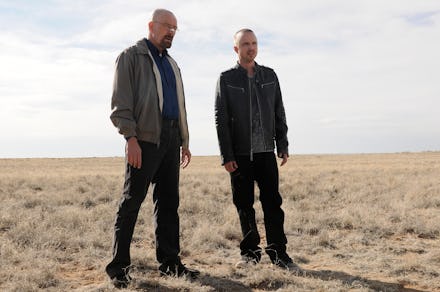5 Rules Every 'Breaking Bad' Fan Knows About Spoilers

It happened with the "Red Wedding" episode of Game of Thrones, with the series finale of Breaking Bad, and with any movie that hints at having a surprise ending. Whenever a significant event happens on a show or movie, people can't help but flock to the internet to broadcast to the world that they've seen the ending, and that they thought it was awesome, satisfying, or disappointing. After the hype surrounding the end of Breaking Bad, every fan of serious TV knows exactly how bad this can get.
It must feel great to be active participant in popular culture — to be the first to witness a landmark television event. But it's time that somebody stood up for people the world over who were working late, had to get to the gym, or fell asleep. People would rather not live in the fear that you'll give something away by crafting a clever status update indicating that you're "in the know."
Social media outlets have long made it necessary to establish some best practices for the internet. Before social media, the only way to learn about a significant television event was by overhearing someone talk about it at the water cooler or possibly by noticing an article in a magazine that would at least have the decency to warn readers that spoilers follow.
That was then. Now, social media spoiler landmines have proliferated. The internet makes it impossible to avoid information one does not want to know. The following are necessary ground rules for engaging in social media after bearing witness to a landmark television or movie event:
1. Enjoying something doesn't mean you have to tell the world about it.
When you think something is awesome, you don't need to share that over the internet. Call a friend. Tell a co-worker. Talk to the stranger on the bus next to you. But do not use those giddy, excited feelings as an excuse to broadcast them to the world.
2. Have a conversation, don't write a status update.
Social media has changed the social norms. It's easier to address an internet audience than it is to talk to a friend. What happened to telling a human being what you saw? How about stepping away from the computer and meeting someone for coffee?
3. Little clues are not cool.
Telling us how you feel about an ending is giving something away. If you tell us the ending was sad, you're giving something away. If you let us know that it was a crazy awesome ending, you're giving something away. Worse than that is providing clever hints at the nature of ending in your status update.
A friend of mine once wrote that the last episode of a show was a little too "blue." Why did you put the word blue in quotes, you jerk? You're just spoiling it for others.
4. Television fans deserve the authentic viewing experience.
Admittedly, this is the motivator behind all of this etiquette. Fans allocate a lot of energy into their shows and movies — not just in terms of time, but in terms of emotional attachment to the characters. Some people's favorite show gets them through the tough work week, break-ups, or any number of sadnesses. Each fan deserves to see their show to the end. Depriving of them of that experience is akin to theft.
5. Brushing off another fan's love proves you're not a real fan.
The internet is still wild when it comes to ruining television shows. Natural filters like time and space do not apply to the onslaught of information, opinions, and thoughts out there. When it comes to show spoiling, we're all responsible. But anyone who thinks it's ok to deprive somebody of their authentic experience of a beloved show is not a real fan.